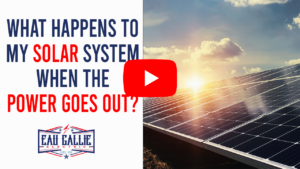Eau Gallie Electric Solar Power During a Power Outage
What Happens to My Solar System When the Power Goes Out?
Living in Florida, where power outages are not uncommon, having a solar system can be a valuable asset. However, it’s essential to understand how your solar system functions during a power outage. In this blog post, we will explore what happens to your solar system when the power goes out, addressing the common misconceptions and shedding light on the backup options available.
The Basics of Solar Power: Before delving into the topic, let’s quickly recap how solar power systems work. Solar panels, also known as solar arrays, harness sunlight and convert it into electricity through a process called photovoltaics. This energy is then used to power your home’s electrical appliances and devices. Additionally, excess electricity generated by the solar panels can be sent back to the utility grid, allowing you to earn credits or offset your energy costs through net metering.
Solar Power During a Power Outage: In most cases, when a power outage occurs and the utility grid goes down, your solar system will also shut off. This happens for safety reasons and to prevent the excess solar energy from flowing back into the grid, which could endanger utility workers trying to fix the power lines.
When the power goes out, the solar inverter, responsible for converting DC electricity from the solar panels into AC electricity for use in your home, will automatically disconnect from the grid to protect against back feeding. This means that even though your solar panels might still be receiving sunlight, they won’t be able to power your home until the grid is restored.
Micro Inverters: A Backup Solution: In recent years, advancements in solar technology have introduced micro inverters. Unlike traditional string inverters, micro inverters are installed on each individual solar panel, allowing them to operate independently. This means that even during a power outage, micro inverters can continue to generate a limited amount of electricity from the solar panels.
While micro inverters provide a small backup power supply, it is important to note that this backup is typically limited to powering only a few essential devices or appliances. It’s not designed to provide full-home backup power during an extended outage. Therefore, it’s crucial to have realistic expectations about the backup capabilities of your solar system.
Alternative Backup Options: If you desire a more comprehensive backup power solution, you can consider installing a battery storage system in conjunction with your solar panels. Solar batteries, such as lithium-ion batteries, can store excess solar energy generated during the day and provide power to your home when the sun is not shining or during a power outage. These batteries allow you to store energy and use it as needed, providing greater independence from the grid.
By combining solar panels with battery storage, you can enjoy uninterrupted power during outages and further maximize the benefits of your solar system. It’s important to note that adding battery storage to your solar system involves additional costs and requires professional installation.
Conclusion: While solar panels are a fantastic renewable energy solution, it’s essential to understand their limitations during a power outage. In most cases, when the grid goes down, your solar system will not be able to provide power unless you have a backup solution like micro inverters or battery storage.
If you’re interested in backup power during outages, it’s recommended to consult with one of our solar energy professional to assess the best options for your specific needs. They can help determine the feasibility and costs associated with adding backup capabilities to your solar system, ensuring you have a reliable and resilient source of electricity when you need it the most.

